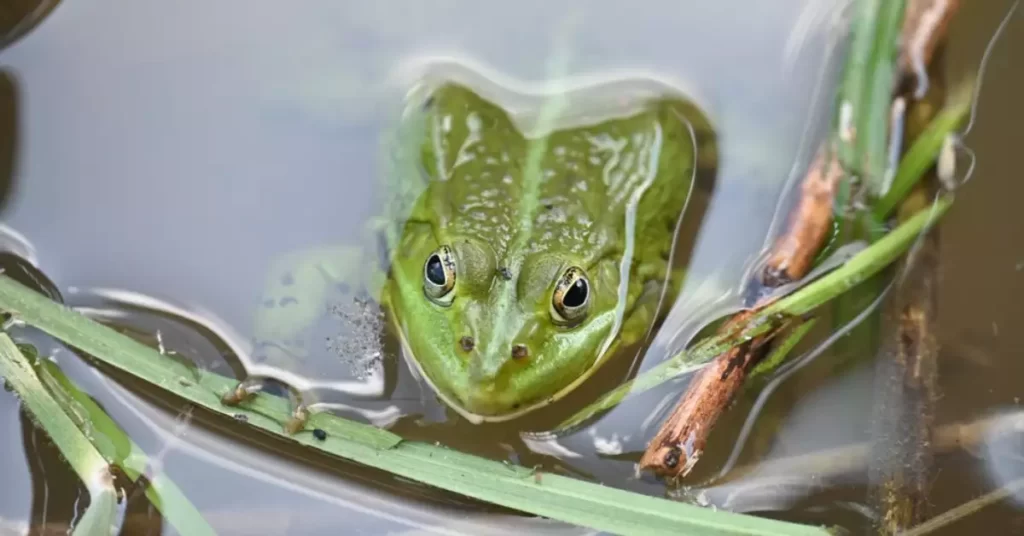When it comes to providing the best diet for our pet frogs, many people often wonder if they can simply feed their amphibian friends fish food.
While it might seem like a convenient solution, there is more to consider than just the availability and cost of fish food.
In this comprehensive guide, we will delve into the topic of whether or not frogs can eat fish food, the nutritional needs of frogs, and the potential risks involved in feeding fish food to frogs.
Understanding the Frog Diet
Natural Diet in the Wild
In their natural habitat, frogs primarily consume a carnivorous diet consisting of insects, worms, and other small invertebrates.
Some larger species of frogs may even eat small fish, amphibians, or mammals. Frogs are opportunistic feeders, which means they will eat whatever is available and can fit in their mouths.
This varied diet ensures they receive all the necessary nutrients for optimal growth and health.
Pet Frog Diet Requirements
When it comes to pet frogs, it is essential to mimic their natural diet as closely as possible.
Providing a balanced diet that includes a variety of insects and other live prey items will help ensure your frog receives the necessary nutrients for growth, reproduction, and overall health.
Some of the most commonly recommended foods for pet frogs include crickets, mealworms, earthworms, and fruit flies.
What’s in Fish Food?
Common Ingredients in Fish Food
Fish food is formulated specifically to meet the nutritional requirements of fish, which are quite different from those of frogs.
Common ingredients in fish food include fish meal, shrimp meal, wheat flour, soybean meal, and various vitamins and minerals.
These ingredients provide the necessary proteins, fats, carbohydrates, and essential nutrients for fish health and growth.
Nutritional Differences Between Fish and Frog Food
While fish food may contain some of the same ingredients found in frog food, the proportions of these ingredients and the overall nutritional makeup are quite different.
Fish food is typically higher in carbohydrates and lower in proteins and fats than frog food. This difference in nutritional composition can lead to health problems if fish food is used as a primary food source for frogs.

Can Frogs Eat Fish Food?
Potential Health Risks
Feeding fish food to frogs can potentially lead to various health issues due to the differences in nutritional requirements between the two species.
For example, a diet high in carbohydrates and low in protein can lead to obesity and growth problems in frogs.
Moreover, a diet lacking in essential nutrients such as calcium can lead to metabolic bone disease and other health complications.
Alternative Food Sources for Frogs
While it is not recommended to feed fish food to frogs, it is important to provide them with a balanced diet that meets their specific nutritional needs.
In addition to the staple foods mentioned earlier, it is also beneficial to offer a variety of supplemental foods, such as wax worms, hornworms, and silkworms.
These supplemental foods can provide additional nutrients and variety to your frog’s diet.
Feeding Your Pet Frog
Staple Foods for Pet Frogs
As mentioned earlier, the staple foods for pet frogs should consist primarily of insects and other live prey items. Some of the most commonly recommended staple foods include:
- Crickets: A popular choice for many pet frogs, crickets are high in protein and can be easily gut-loaded with additional nutrients before feeding.
- Mealworms: Another good source of protein, mealworms can be fed to frogs occasionally but should not make up the majority of their diet due to their relatively high-fat content.
- Earthworms: These are a great source of protein and moisture, making them an excellent food choice for terrestrial frogs.
- Fruit Flies: Ideal for smaller frog species, fruit flies are a good source of protein and can be easily cultured at home.
Supplemental Foods for Pet Frogs
In addition to staple foods, it is essential to provide a variety of supplemental foods to ensure your frog receives all the necessary nutrients. Some popular supplemental food options include:
- Waxworms: High in fat, waxworms should be fed sparingly as a treat to prevent obesity in your pet frog.
- Hornworms: These soft-bodied caterpillars are high in protein and moisture, making them a nutritious supplemental food option.
- Silkworms: Another excellent choice for supplemental feeding, silkworms are high in protein and contain essential amino acids that are beneficial to your frog’s health.
FAQs
Can frogs eat fish flakes or pellets?
While frogs may occasionally consume fish flakes or pellets, it is not recommended to use these products as their primary food source.
The nutritional content of fish food does not meet the specific dietary needs of frogs, and long-term use can lead to health issues.
Can I feed my frog frozen or dried insects?
While it is possible to feed your frog frozen or dried insects, it is generally better to provide live prey items.
Live insects are more nutritionally complete and provide stimulation and enrichment for your pet frog during feeding.
How often should I feed my pet frog?
The frequency of feeding depends on the age, species, and individual needs of your pet frog.
Younger frogs may require daily feedings, while adult frogs can often be fed every other day or a few times per week.
It is essential to monitor your frog’s body condition and adjust feeding frequency accordingly.
Conclusion
Feeding your pet frog fish food is not recommended due to the nutritional differences between the two species.
Instead, it is important to provide a balanced and varied diet that includes staple foods such as crickets, mealworms, earthworms, and fruit flies, as well as supplemental options like waxworms, hornworms, and silkworms.
By offering a diet tailored to your frog’s specific needs, you will help ensure their health, growth, and overall well-being.